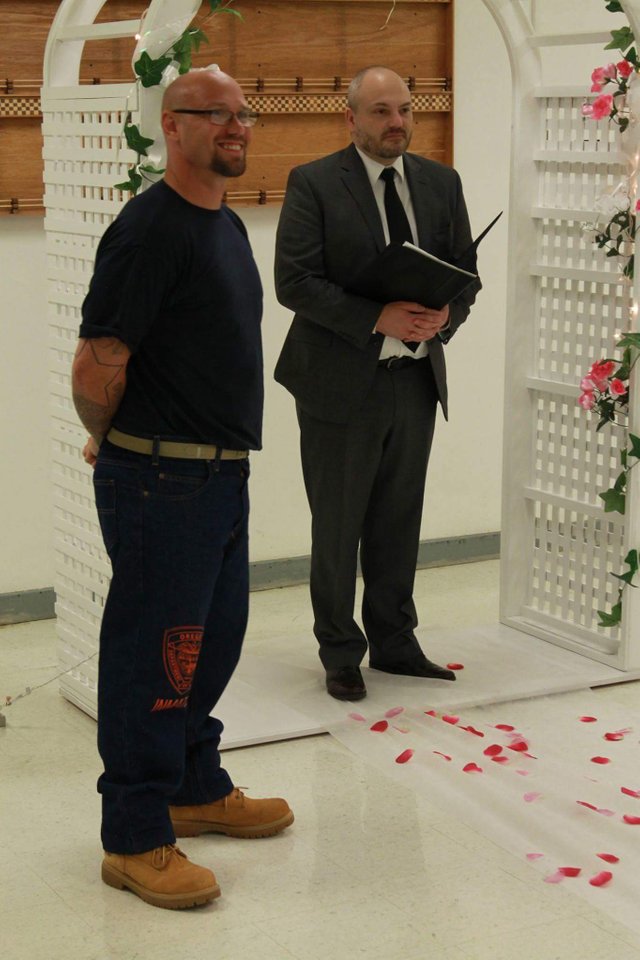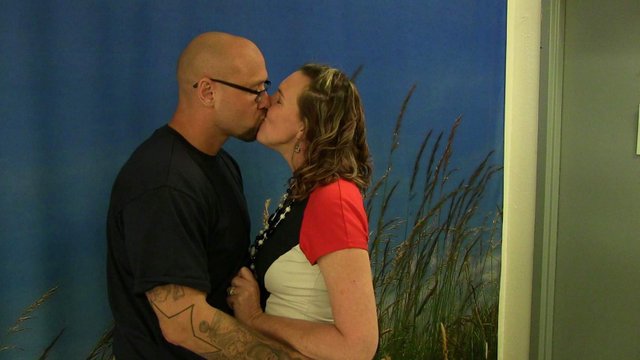Exchanging Vows In Oregon State Penitentiary
Tensions were running high in the reception area of the Oregon State Penitentiary on wedding ceremony day. Jo, one of the day’s many brides, had somehow fashioned an updo free of bobby pins so as not to send the metal detector howling. She had also stashed two backup outfits in the car in case the guards deemed her wedding dress — a black-and-red sheath from Rent the Runway — too formfitting. Anthony Behrens, the man who would perform Jo’s nuptials, fiddled with his dossier of papers to make sure all the documentation was in order. I hoped nobody would notice that I was wearing a sports bra under my dress — underwire is the enemy of metal detectors. It would be the only time I’ve ever worn such an undergarment to a wedding.
Twice a year, the maximum-security prison cancels regular visiting hours so that several dozen weddings can take place. On this spring Tuesday, Oregon State Prison felt as charged as any church, synagogue, or city hall before the slew of wedding ceremonies about to take place. Jo was already a bundle of nerves and needed to be reminded to choke down a few bites of dry toast, as we scrambled to write down her vows on a few sheets from my reporter’s notebook. But tensions dissipated when we met Ben, Jo’s betrothed, a fit 39-year-old serving a nine-year sentence for attempted murder and assault. The couple met two years prior on a prison pen-pal website. Ben proposed on their second visit, and this will be the third time he and Jo have seen each other face-to-face. They will spend the first four years of their marriage on opposite coasts — Jo currently lives in Georgia — punctuated by a biannual visit. Since Oregon does not grant inmates conjugal visits, the couple might have to wait years to consummate their marriage.
But no one was thinking about that during the couple’s wedding day. Instead, it was all smiles, even from the corrections officers. Prisoners and their partners enjoy special privileges: a wedding cake made of stacked powdered donuts and the opportunity to sit next to each other. (During a regular visit, couples must face one another across a table.)
Jo and Ben were the first wedding that morning. Several prisoners had been assigned the roles of photographing and videotaping the wedding, but otherwise it was just me and Mona, a friend of Ben’s. Behrens made his way under the white wedding archway alongside Ben, who wore blue jeans stamped OREGON STATE PENITENTIARY. No matter the scenery, the moment was electric, as Mona, Jo, and I stood at the bottom of the plastic makeshift runway, waiting for some kind of cue to get started. Ben sung the first few bars of the bridal march. Out of pure reflex, Mona and I each grabbed Jo’s arms and walked her down the aisle.
Behrens, in a finely pressed suit, stood between the couple and read from a script about love and support with a dignified gravitas as if we were at St. Patrick’s Cathedral. Jo and Ben, holding hands, exchanged their customized vows. It felt like they were holding one another up. Ben’s prison Toastmasters class paid off: His speech was perfectly memorized. He spoke about communication and learning all of Jo’s languages and translations. Jo got teary.
Not for a moment did I forget I was in a prison. But I did see two people declare love for each other in a way that felt totally unbridled and genuine, like they weren’t in a prison. I saw two people commit to a life that will not be easy — and not just because marriage itself isn’t easy. (Which it isn’t.) They sealed their vows with a kiss—the kiss of two people who don’t get to do so very often. For all of us, that made it a kiss with some extra oomph behind it. After, the couple grinned from ear to ear.
I caught up with Behrens a few weeks later to ask about his experience officiating prison weddings. Judges, along with religious leaders and county clerks, can perform weddings in the state of Oregon. Behrens has since left the bench and mainly practices public policy law. These weddings are his side hustle, and he doesn’t just do them in prisons. In fact, Behrens is one of the highest-rated wedding officiants on Wedding Wire in the state of Oregon.
But prison weddings are special to him: “When you have a wedding in a fancy place like a big country club with a lot of people, it ends up being more about the production than the couple. Prison weddings are all about the couple.” Behrens lowers his typical fee of $195 to $95 for these types of nuptials. “My assumption is the people who are getting married in prison don’t have the same resources.”
But as someone who has experienced many happy couples, he gets a sense that not every prison marriage is true love. “Sometimes you can feel the love coming off of them,” Behrens said. But sometimes, he admits, it’s a little strange. “I’m curious as to why they are doing this. I always want to know what happens when they get out. They don’t know each other, or you feel this isn’t the best idea. But I’ve never had anyone stop or not go through with it,” he said. This past April, Behrens officiated his first death-row wedding. “It wasn’t really much different than other prison weddings,” he said. “Just a little more intense going in.”
For Jo and Ben to marry in person, they had to seek approval from the prison nearly a year in advance. The couple was required to hire their own officiant, as prison chaplains are forbidden from performing these ceremonies, and Jo said that many of the officiants she emailed never returned her queries. Many states allow prisoners to marry free citizens by proxy, meaning their wedding occurs via paperwork rather than face-to-face.
Though rare, prisoners can also marry one another. The 1987 Supreme Court Decision Turner v. Safley upheld the right: “Although prison officials may regulate the time and circumstances under which a marriage takes place, and may require prior approval by the warden, the almost complete ban on marriages here is not, on the record, reasonably related to legitimate penological objectives.”
Yet this right is being challenged in Nebraska. Prisoners Paul Gillpatrick and Niccole Wetherell are being represented by the ACLU in order to wed. The couple met through a mutual friend prior to prison and have maintained their relationship through letters. Both have lengthy sentences for violent crimes. Prison officials refused their request, stating a provision denying prisoners transportation for weddings, and then later denied them the opportunity to exchange vows over video conferencing, saying a minister needed to be present. In 2014, then-governor Dave Heineman declared spending taxpayer dollars to accommodate a prisoner wedding would be “an outrage.” Since September 2017, the couple has been awaiting a new hearing date in a Nebraska lower court. Danielle Conrad, executive director of the ACLU of Nebraska, said, “Our clients look forward to their day in court to affirm the clear precedent from the United States Supreme Court that states, ‘Inmate marriages, like others, are expressions of emotional support and public commitment.’”
Jo and Ben were lucky enough to spend their special day together. After the ceremony, they sat cuddled together, enjoying the newfound (if fleeting) physical intimacy.
“Other than the days my children were born, this is the happiest day of my life,” Jo said. “This is the happiest day of my new life,” Ben agreed. “In my old life, it was when I robbed a lottery store for $12,000!”
“That’s my husband!” Jo said.
We all laughed. The coming years will contain inevitable challenges: long distance and a lack of physical intimacy first, the obstacles of reentering society later. But on Jo and Ben’s wedding day, love was the only thing on their minds.
Posted from my blog with SteemPress : https://selfscroll.com/exchanging-vows-in-oregon-state-penitentiary/

